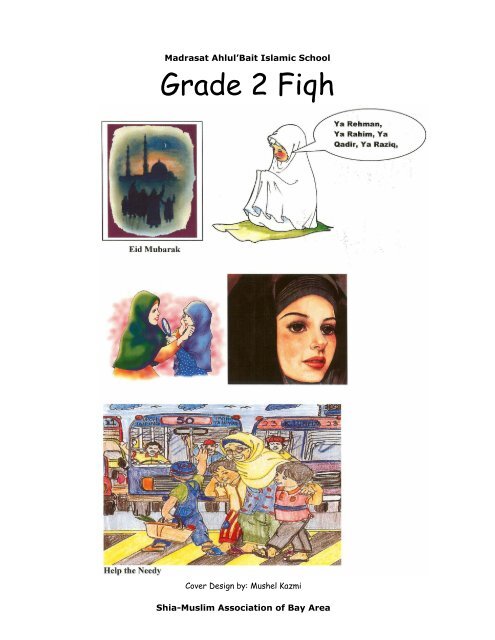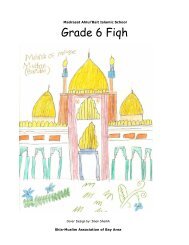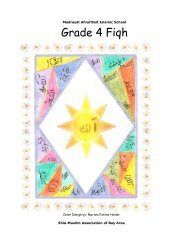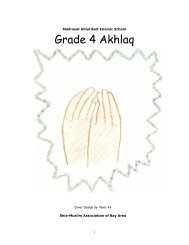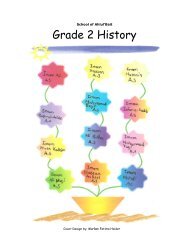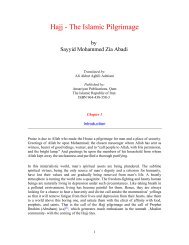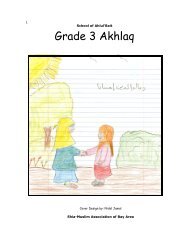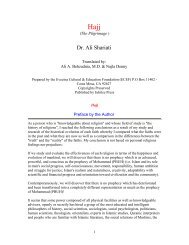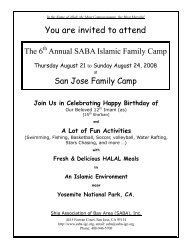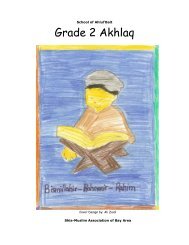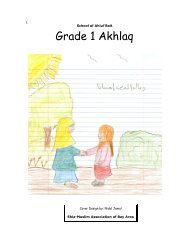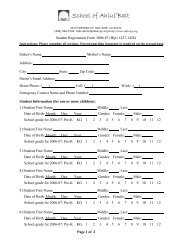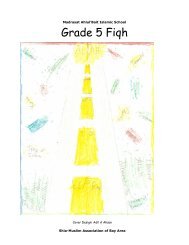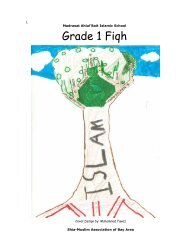Grade 2 Fiqh Book (PDF) - Shia Multimedia
Grade 2 Fiqh Book (PDF) - Shia Multimedia
Grade 2 Fiqh Book (PDF) - Shia Multimedia
Create successful ePaper yourself
Turn your PDF publications into a flip-book with our unique Google optimized e-Paper software.
Madrasat Ahlul’Bait Islamic School<br />
<strong>Grade</strong> 2 <strong>Fiqh</strong><br />
Cover Design by: Mushel Kazmi<br />
<strong>Shia</strong>-Muslim Association of Bay Area
First Edition (Revision 2.0)<br />
First Printing May, 2005<br />
Second Printing February, 2006<br />
Compilers and Co-Authors:<br />
Samina Ali, Member, Syllabus Committee,<br />
Madrasat Ahlul’Bait, <strong>Shia</strong>-Muslim Association of Bay Area<br />
Editors:<br />
Samina Ali, Member, Syllabus Committee,<br />
Madrasat Ahlul’Bait, <strong>Shia</strong>-Muslim Association of Bay Area<br />
Copyright Free & Non-Profit Notice:<br />
Madrasat Ahlul’Bait curriculum material can be freely copied, duplicated, reproduced, quoted,<br />
distributed, printed, used in derivative works and saved on any media and platform for non-profit<br />
and educational purposes only. A fee no higher than the cost of copying may be charged for the<br />
material.<br />
Note from Madrasat Ahlul’Bait:<br />
The Publishers and the Authors have made every effort to present the Quranic verses, prophetic<br />
and masomeen traditions, their explanations and the material from the sources referenced in an<br />
accurate, complete and clear manner. We ask for forgiveness from Allah (SWT) and the readers if<br />
any mistakes have been overlooked during the review process.<br />
Contact Information:<br />
Any correspondence related to this publication and all notations of errors or omissions should be<br />
addressed to Syllabus Committee, Madrasat Ahlul’Bait, <strong>Shia</strong>-Muslim Association of Bay Area at<br />
saba@saba-igc.org.<br />
Published by:<br />
Madrasat Ahlul’Bait<br />
<strong>Shia</strong>-Muslim Association of Bay Area<br />
4415 Fortran Court, San Jose, CA 95134, USA<br />
www.saba-igc.org<br />
saba@saba-igc.org<br />
LIMIT OF LIABILITY/DISCLAIMER OF WARRANTY: THE PUBLISHER AND THE AUTHORS MAKE NO REPRESENTATIONS<br />
OR WARRANTIES WITH RESPECT TO THE ACCURACY OR COMPLETENESS OF THE CONTENTS OF THIS WORK AND<br />
SPECIFICALLY DISCLAIM ALL WARRANTIES, INCLUDING WITHOUT LIMITATION WARRANTIES OF FITNESS FOR A<br />
PARTICULAR PURPOSE. NO WARRANTY MAY BE CREATED OR EXTENDED BY SALES OR PROMOTIONAL MATERIALS.<br />
THE ADVICE AND STRATEGIES CONTAINED HEREIN MAY NOT BE SUITABLE FOR EVERY SITUATION. NEITHER THE<br />
PUBLISHER NOT THE AUTHORS SHALL BE LIABLE FOR DAMAGES ARISING HEREFROM. THE FACT THAT AN<br />
ORGANIZATION, BOOK OR WEBSITE IS REFERRED TO IN THIS WORK AS A CITATION AND/OR A POTENTIAL SOURCE<br />
OF FURTHER INFORMATION DOES NOT MEAN THAT THE AUTHORS OR THE PUBLISHER ENDORSES THE<br />
INFORMATION THE ORGANIZATION OR WEBSITE MAY PROVIDE OR RECOMMENDATIONS IT MAY MAKE. FURTHER,<br />
READERS SHOULD BE AWARE THAT BOOKS AND INTERNET WEBSITES LISTED IN THIS WORK MAY HAVE CHANGED<br />
OR DISAPPEARED BETWEEN WHEN THIS WORK WAS WRITTEN AND WHEN IT IS READ. SHIA ASSOCIATION OF BAY<br />
AREA IS NOT ASSOCIATED WITH ANY ORGANIZATION, PRODUCT OR VENDOR MENTIONED IN THIS BOOK.<br />
2 <strong>Grade</strong> 2 <strong>Fiqh</strong>
Table of Contents<br />
Table of Contents ...........................................................................................................3<br />
Foreword ........................................................................................................................5<br />
Preface............................................................................................................................6<br />
Section I: Islamic Beliefs (<strong>Fiqh</strong>) ....................................................................................7<br />
Chapter 1: Usool-e-Deen ...............................................................................................8<br />
1.1 Introduction ..........................................................................................................................9<br />
1.2 Worksheet: Usool-e-Deen ..................................................................................................10<br />
Chapter 2: Asma’-ul-Husna .........................................................................................13<br />
2.1 Worksheet: Asma-ul-Husna ...............................................................................................14<br />
Chapter 3: Surah Al Ikhlas...........................................................................................15<br />
3.1 Worksheet: Surah Al Ikhlas ...............................................................................................16<br />
Chapter 4: Introduction to laws....................................................................................17<br />
4.1 Wajib ..................................................................................................................................17<br />
4.2 Haraam ...............................................................................................................................18<br />
4.3 Mustahab ............................................................................................................................19<br />
4.4 Makruh ...............................................................................................................................20<br />
4.5 Mubah (Jaiz):......................................................................................................................21<br />
4.6 Worksheet: Introduction to Laws.......................................................................................22<br />
Chapter 5: Introduction to Najasat...............................................................................25<br />
5.1 Worksheet: Introduction to Najasat....................................................................................26<br />
Chapter 6: Taharat........................................................................................................27<br />
6.1 Worksheet: Taharat ............................................................................................................28<br />
Chapter 7: Wudhu - Explanation .................................................................................29<br />
7.1 Worksheet: Wudhu Explanation ........................................................................................30<br />
7.2 Wudhu- Sunnat Actions .....................................................................................................31<br />
7.3 Worksheet: Sunnat Actions................................................................................................32<br />
7.4 Wajib Actions of Wudhu....................................................................................................33<br />
7.5 Worksheet: Wajib Actions of Wudhu ................................................................................35<br />
Chapter 8: Compete Wudhu - Revision.......................................................................36<br />
8.1 Complete Wudhu: Practical Demonstration.......................................................................37<br />
8.2 Worksheet: Complete Wudhu ............................................................................................38<br />
Chapter 9: Brief Introduction to Taqleed.....................................................................39<br />
9.1 Worksheet: Brief Introduction to Taqleed .........................................................................40<br />
Chapter 10: Adhan and Iqama .....................................................................................41<br />
10.1 Adhan .................................................................................................................................41<br />
10.2 Whole Adhan......................................................................................................................42<br />
10.3 Iqama..................................................................................................................................43<br />
10.4 Worksheet: Iqama ..............................................................................................................44<br />
10.5 Whole Iqama ......................................................................................................................45<br />
10.6 Adhan and Iqama – Review and Differences.....................................................................46<br />
Chapter 11: Correct Recitation of Surah Al Fateha....................................................47<br />
<strong>Grade</strong> 2 <strong>Fiqh</strong> 3
11.1 Worksheet: Translation of Surah al-Hamd.........................................................................48<br />
Chapter 12: Salaat (Daily Prayers) ..............................................................................49<br />
12.1 Worksheet: Salaat...............................................................................................................50<br />
Chapter 13: Actions of Salaat ......................................................................................52<br />
13.1 Demonstration ....................................................................................................................53<br />
Chapter 14: The Place for Salaat .................................................................................54<br />
14.1 Worksheet: The Place for Salaat ........................................................................................56<br />
Chapter 15: Ka’bah is my Qiblah ................................................................................57<br />
15.1 Why should we face Ka'bah? .............................................................................................57<br />
15.2 Facing the Qiblah ...............................................................................................................58<br />
15.3 The Qibla............................................................................................................................59<br />
Chapter 16: Zakat and Khums .....................................................................................60<br />
16.1 Zakat...................................................................................................................................60<br />
16.2 Khums ................................................................................................................................61<br />
16.3 Work sheet – Khums (One-Fifth of Your Savings) ...........................................................62<br />
Chapter 17: Imam Muhammad Al Mahdi (AS)...........................................................63<br />
17.1 Why is Imam in Ghaybah?.................................................................................................64<br />
17.2 Preparing for the Imam to Come........................................................................................64<br />
17.3 Remember Him through Reciting Duas and Ziyarat..........................................................65<br />
17.4 Be a Good Muslim .............................................................................................................65<br />
17.5 Worksheet: Imam Muhammad Al Mehdi (a).....................................................................66<br />
SECTION II: Special Occasions..................................................................................67<br />
Chapter 18: Sawm (Fasting in the Month of Ramadhan) ............................................68<br />
18.1 Worksheet: Sawm ..............................................................................................................69<br />
Chapter 19: Hajj ...........................................................................................................71<br />
19.1 A Letter from Mecca ..........................................................................................................71<br />
19.2 Worksheet: Hajj..................................................................................................................75<br />
Acknowledgements......................................................................................................76<br />
4 <strong>Grade</strong> 2 <strong>Fiqh</strong>
In the Name of Allah the Most Gracious Most Merciful<br />
Foreword<br />
The material presented in this document is a result of an effort made by the<br />
personnel of the school of Ahlul’Bait of the <strong>Shia</strong>-Muslim Association of Bay Area<br />
Islamic Center at San Jose, California in cooperation with several schools of<br />
Ahlul’Bait at London-Stanmore, London-Hujjat, Vancouver, Minnesota and Toronto.<br />
We, at San Jose, looked at material from London-Stanmore, London-Hujjat,<br />
Vancouver, Minnesota, Toronto and Irvine's Islamic institutions, as well as that<br />
available at various web-sites to compile age appropriate textbooks for use by our<br />
students. We thank the institutions that were kind enough to provide us with the<br />
electronic files of their curriculum. We used some of what they had and added to it<br />
what we felt was appropriate. We included more worksheets and pictures where<br />
deemed necessary. We also added some new topics that, we felt are important to<br />
the students.<br />
We had two important goals in mind while working on this document. First, introduce<br />
the students to the important Islamic concepts and beliefs that are crucial for him/her<br />
to know. Second, expose the students to as many Quranic verses and sayings from<br />
Prophet Muhammad (p) and his Ahlul’Bait (a) as possible.<br />
We thank Hujjatul Islam Maulana Nabi Raza Abidi for his spiritual guidance. We hope<br />
future efforts will continue taking place until reaching our goal of having a strong, rich<br />
and unified curriculum for the schools of Ahlul’Bait for all ages.<br />
Syllabus Committee<br />
Madrasat Ahlul’Bait<br />
<strong>Grade</strong> 2 <strong>Fiqh</strong> 5
Preface<br />
In this book the students are introduced to Usool-e-Deen, Asma-ul-Husan and the<br />
way Islam classifies the deeds. After introducing Najasat and Taharat, there are<br />
detailed lessons on Wudhu, Adhan and Iqama along with a brief introduction of Salat.<br />
Brief introductions of Zakat, Khums, Hajj and Sawm are also included in the book.<br />
There is also a chapter on the awareness of our living Imam (a).<br />
6 <strong>Grade</strong> 2 <strong>Fiqh</strong>
Section I: Islamic Beliefs (<strong>Fiqh</strong>)<br />
<strong>Grade</strong> 2 <strong>Fiqh</strong> 7
Chapter 1: Usool-e-Deen<br />
Usool-e-deen are the roots of our religion. They are also called our beliefs. They are<br />
five in number.<br />
TAWHEED<br />
QAYAAMAT<br />
ADAALAT NABUWWAAT IMAAMAT<br />
Oneness of<br />
God<br />
Day of<br />
Judgement<br />
Justice of<br />
God<br />
Successors of<br />
the Prophet<br />
Prophethood<br />
USOOL E DEEN ARE ROOTS OF RELIGION. THERE ARE FIVE.<br />
THESE ARE TAWHEED, ADALAT, NUBUWWAT, IMAAMAT & QAYAAMAT<br />
8 <strong>Grade</strong> 2 <strong>Fiqh</strong>
1.1 Introduction<br />
Just as a tree is made up of roots and branches so is the religion of Islam.<br />
Usool-e-din = the roots of the religion<br />
Furoo-e-din = the branches of the religion<br />
Just as in a tree the roots are more important to the tree then the branches, so in<br />
Islam the Usool is more important for our Faith then Furoo.<br />
If in a tree the branches of the tree were to be<br />
chopped off the tree would still live and the branches<br />
would grow back slowly, but if the roots of the tree were to<br />
be chopped off, the tree would die.<br />
In the same way if one does not fully understand<br />
the furoo (branches) but does them anyway, the<br />
religion (Islam) would still live and the understanding<br />
would come slowly.<br />
Dead<br />
tree<br />
Weak roots<br />
Yet if a person does not understand the Usool (roots) then his Faith would die<br />
because these are basic beliefs of Islam.<br />
Every Muslim has to understand Usool to the best of their ability.<br />
Usool-e-din (roots of religion) are 5:<br />
1. Tawheed - Allah is One.<br />
2. Adaalat - Allah is Just.<br />
3. Nabuwwat - Allah sent 124,000 Prophets to guide us.<br />
4. Imamat - Allah sent 12 Imams to guide us.<br />
5. Qiyamat - The Day of Judgement.<br />
<strong>Grade</strong> 2 <strong>Fiqh</strong> 9
1.2 Worksheet: Usool-e-Deen<br />
Answer the following:<br />
1. Why are the Usools more important to our Faith than the Furoos?<br />
Usools are more important to our Faith because:<br />
__________________________________________________________________<br />
__________________________________________________________________<br />
_____________________________________________.<br />
2. Which Usool teaches us that there is only One God?<br />
______________________________________________________.<br />
3. Which Usool talks about the Day when we will be rewarded for all the good<br />
things we do in our lives?<br />
______________________________________________________.<br />
10 <strong>Grade</strong> 2 <strong>Fiqh</strong>
Learn the following poem<br />
Usool-e-din,<br />
Usool-e-din,<br />
The roots of Islam are five,<br />
The roots of Islam are five,<br />
Tawheed, Adaalat, Nabuwwat, Imamat, and Qiyamat,<br />
Usool-e-din,<br />
Usool-e-din,<br />
Allah is one and He is just<br />
Allah is one and He is just<br />
Prophets He sent many to guide us<br />
Prophets He sent many to guide us<br />
Imams twelve He also sent us<br />
Imams twelve He also sent us<br />
And on the Day of Judgement He will ask us,<br />
<strong>Grade</strong> 2 <strong>Fiqh</strong> 11
Zakat<br />
Khums<br />
Jihad<br />
Amrbilmaroof<br />
Hajj<br />
Nahi-un-il munkir<br />
Sawm<br />
Tawalla<br />
Salat<br />
Tabarra<br />
Tawheed<br />
Qiyamat<br />
Adl<br />
Nabuwat<br />
Imamat<br />
USOOL-E-DEEN &<br />
FROO-E-DEEN<br />
12 <strong>Grade</strong> 2 <strong>Fiqh</strong>
Chapter 2: Asma’-ul-Husna<br />
The title Allah is the ideal name for God, all other titles including Rabb, are<br />
attributes or names of God. Imam Ja`fer al-Sadiq (s) has quoted his forefathers<br />
quoting Prophet Muhammad (s.a.w) as saying,<br />
"There are ninety-nine Attributes, one hundred minus one, of Allah; whoever<br />
counts them will enter Paradise."<br />
Allah's various powers are described by His Names or His Attributes.Allah's<br />
Attributes are called Al-Asma-ul Husna, The Beautiful Names.<br />
Almighty Allah does not desire anything from His creation except that He is<br />
worshipped. But Allah cannot be worshipped unless one learns to know Him and<br />
He cannot be known except if He is remembered. This road has been made easy<br />
by Allah Himself. In the Qur'aan He says:<br />
Prophet Mohammed (s) has said,<br />
"And to Allah belongs the Beautiful Names,<br />
so call upon Him by these Names."<br />
"Inspire yourselves with the qualities of Allah."<br />
We will learn the meanings of all 99 names later. In this class we will concentrate<br />
on the names of Rabb, Muhaymin, ‘Azeez, ‘Aadl and Lateef. The meanings are not<br />
absolutely equivalent to their synonyms in Arabic but they are close.<br />
Al Rahman<br />
Al Rahim<br />
Al Qadir<br />
Al Raziq<br />
Al Khaliq<br />
= The Most gracious<br />
= The Merciful<br />
= The Powerful<br />
= The provider<br />
= The creator<br />
<strong>Grade</strong> 2 <strong>Fiqh</strong> 13
2.1 Worksheet: Asma-ul-Husna<br />
Connect the Stars to the right banner.<br />
The Creator<br />
Al<br />
Rahman<br />
Al<br />
Raheem<br />
The Most Gracious<br />
Al Khaliq<br />
The Provider<br />
Al Raziq<br />
The Merciful<br />
Al Qadir<br />
The Powerful<br />
14 <strong>Grade</strong> 2 <strong>Fiqh</strong>
Chapter 3: Surah Al Ikhlas<br />
1. Bismillahir Rahmanir Rahim<br />
I commence with the<br />
Name of Allah, The<br />
Compassionate -<br />
The Merciful.<br />
Surah al-Ikhlas<br />
2. Qul huwallahu Ahad<br />
0 Prophet! Say:<br />
Allah is One - the<br />
Eternal Being.<br />
3. Allahus -Samad<br />
Allah is the<br />
Sustainer.<br />
4. Lam yalid walam yulad<br />
He begot none, nor<br />
was He begotten.<br />
5. Walam yakullahu kufuwan ahad<br />
And none in the<br />
creation is equal to<br />
Him.<br />
<strong>Grade</strong> 2 <strong>Fiqh</strong> 15
3.1 Worksheet: Surah Al Ikhlas<br />
Translation of Surah al-lkhlas - Connect to the correct box<br />
1. Bismillahir Rahmanir Rahim<br />
Allah is the<br />
Sustainer.<br />
2. Qul huwallahu Ahad<br />
0 Prophet! Say:<br />
Allah is One - the<br />
Eternal Being.<br />
3. Allahus -Samad<br />
I commence with the<br />
Name of Allah, The<br />
Compassionate -<br />
The Merciful.<br />
4. Lam yalid walam yulad<br />
And none in the<br />
creation is equal to<br />
Him.<br />
5. Walam yakullahu kufuwan ahad<br />
He begot none, nor<br />
was He begotten.<br />
16 <strong>Grade</strong> 2 <strong>Fiqh</strong>
Chapter 4: Introduction to laws<br />
All actions that we do come into one of the five deeds: Waajib , Haraam, Mustahab,<br />
Makrooh and Mubaah<br />
4.1 Wajib<br />
WAJIB = you have to do it.<br />
Wearing Hijab is Wajib.<br />
Colour in the picture and see if you can draw a few more things that are also<br />
Wajib.<br />
Now put a big tick across the page because Wajib means you have to do it.<br />
<strong>Grade</strong> 2 <strong>Fiqh</strong> 17
4.2 Haraam<br />
Haraam = you should never do it.<br />
Stealing is Haraam.<br />
Colour in the picture and see if you can draw a few more things that are also<br />
Haraam.<br />
Now put a big cross across the page because Haraam means you should never do<br />
it.<br />
18 <strong>Grade</strong> 2 <strong>Fiqh</strong>
4.3 Mustahab<br />
Mustahab = you should try to do it.<br />
.<br />
Visiting the sick is Mustahab.<br />
Color in the picture and see if you can draw a few more things which are also<br />
Mustahab.<br />
Now put a small tick in the middle of the page because Mustahab means you should<br />
try to do it.<br />
<strong>Grade</strong> 2 <strong>Fiqh</strong> 19
4.4 Makruh<br />
Makruh = you should try not to do it.<br />
To eat too much until you feel sick is Makruh<br />
Color in the picture and see if you can draw a few more things which are also<br />
Makruh.<br />
Now put a small cross in the middle of the page because Makruh means you should<br />
try not to do it.<br />
20 <strong>Grade</strong> 2 <strong>Fiqh</strong>
4.5 Mubah (Jaiz):<br />
Mubah = it does not matter if you do it or not.<br />
Sleeping is Mubah.<br />
Color in the picture and see if you can draw a few more things that are also Mubah.<br />
<strong>Grade</strong> 2 <strong>Fiqh</strong> 21
4.6 Worksheet: Introduction to Laws<br />
Now do this crossword to see if you really understand the terms taught in the last five<br />
lectures.<br />
Clues Across:<br />
1. You have to do it.<br />
2. You should try to do it.<br />
Clues Down:<br />
1. You should try not to do it.<br />
2. You should never do it.<br />
3. You can, or cannot do it, it does not matter.<br />
22 <strong>Grade</strong> 2 <strong>Fiqh</strong>
TRAFFIC CONTROL<br />
RED HARAAM MUST STOP YOURSELF<br />
FLASHING RED MAKRUH BETTER TO STOP<br />
GREEN WAJIB MUST GO (DO)<br />
FLASHING GREEN SUNNAT BETTER TO GO (DO)<br />
4-WAY STOP JA'IZ ALLOWED TO GO (DO)<br />
<strong>Grade</strong> 2 <strong>Fiqh</strong> 23
Reading Quran<br />
Wearing black shoes<br />
Sleeping<br />
Eating pork<br />
24 <strong>Grade</strong> 2 <strong>Fiqh</strong>
Chapter 5: Introduction to Najasat<br />
Najasat = Impurity (not dirty)<br />
Things that are Najis will make other things Najis when:<br />
- they are wet AND<br />
- They are touched by that Najis thing.<br />
Some things that are 'Ayn Najis' - originally Najis are:<br />
- Urine and Stool<br />
- Blood<br />
- Dead body<br />
- Kafir (unbeliever)<br />
- Dog<br />
- Pig<br />
- Alcoholic drinks.<br />
<strong>Grade</strong> 2 <strong>Fiqh</strong> 25
5.1 Worksheet: Introduction to Najasat<br />
Cross out the najis things.<br />
Water Blood Dog<br />
Muslim<br />
Cow<br />
Milk<br />
Soda<br />
Kafir<br />
Fish<br />
Cat<br />
Coffee<br />
Dust<br />
Mice<br />
Stool<br />
Toothpaste<br />
26 <strong>Grade</strong> 2 <strong>Fiqh</strong>
Chapter 6: Taharat<br />
- .<br />
Mutahhiraat = those things that can make a Najis thing Tahir (pure).<br />
TAHARAT means purity but not cleanliness.<br />
Some Mutahhiraat are:<br />
- Water<br />
- Sun<br />
- Becoming a Muslim.<br />
-<br />
The things that are AYN-E-NAJIS like Kafir, dog, blood or pig can never<br />
become tahir.<br />
<strong>Grade</strong> 2 <strong>Fiqh</strong> 27
6.1 Worksheet: Taharat<br />
Circle the things that are tahir.<br />
28 <strong>Grade</strong> 2 <strong>Fiqh</strong>
Chapter 7: Wudhu - Explanation<br />
Wudhu was taught, by our Holy Prophet, Prophet Muhammad (s.a.w.), after he<br />
came back from Me'raj.<br />
In Me'raj the Holy Prophet (s.a.w.) did Wudhu with the water from the river in<br />
Heaven.<br />
Wudhu is the special way to wash yourself before you pray<br />
Wudhu is not only needed for Salaat but also for:<br />
- Tawaf around the Kaa’ba<br />
- Touching the writing of the Holy Qur'an<br />
- Touching the names of Allah and the 14 Ma'sumeen<br />
It is very good to do Wudhu:<br />
- before you go to sleep<br />
- before you go to the Imambara<br />
- when you are angry (as it calms you down)<br />
- In fact anytime at all.<br />
Before doing Wudhu you should make sure that:<br />
- the parts of Wudhu (face, arms, head, feet) are all tahir , AND<br />
- there is nothing on them which would stop the water reaching it<br />
E.g. Plaster, nail varnish, rings, etc<br />
<strong>Grade</strong> 2 <strong>Fiqh</strong> 29
7.1 Worksheet: Wudhu Explanation<br />
Draw a circle round those things that you have to do Wudhu for AND<br />
A square around those things it is good to do Wudhu for.<br />
Before reciting Qur’an<br />
Before going to sleep<br />
Before offering Salaat<br />
Before going to the Mosque<br />
Before Tawaf of Kaa’ba<br />
When you become angry<br />
30 <strong>Grade</strong> 2 <strong>Fiqh</strong>
7.2 Wudhu- Sunnat Actions<br />
Wudhu is divided into:<br />
- Sunnat actions AND<br />
- Wajib actions.<br />
Those actions that are Sunnat, do not have to be done, but if<br />
you do them you get a lot of Thawab.<br />
The Sunnat actions are:<br />
Washing your<br />
hands twice<br />
Gargling three<br />
times.<br />
Taking water into<br />
the nostrils three<br />
times.<br />
<strong>Grade</strong> 2 <strong>Fiqh</strong> 31
7.3 Worksheet: Sunnat Actions<br />
The following are the Sunnat actions of Wudhu.<br />
Colour them in and write how many times each one has to be done.<br />
__________ times<br />
____________ times.<br />
__________ times.<br />
32 <strong>Grade</strong> 2 <strong>Fiqh</strong>
7.4 Wajib Actions of Wudhu<br />
1 st action of Wudhu = Niyyat.<br />
I am doing Wudhu for the<br />
pleasure of Allah,<br />
Qurbatan ilal lah<br />
Niyyat must always be of Qurbatan ilallah.<br />
2 nd action of Wudhu = Washing of the face:<br />
3 rd action of Wudhu = washing of the arms:<br />
<strong>Grade</strong> 2 <strong>Fiqh</strong> 33
4 th action of Wudhu: Masah of the head:<br />
5 th action of Wudhu: Masah of the feet:<br />
34 <strong>Grade</strong> 2 <strong>Fiqh</strong>
7.5 Worksheet: Wajib Actions of Wudhu<br />
Number the Wajib actions of Wudhu to show the right order and then colour them in:<br />
<strong>Grade</strong> 2 <strong>Fiqh</strong> 35
Chapter 8: Compete Wudhu - Revision<br />
Washing Hands Gargling 3 times Washing Nose 3 times<br />
(Sunnat) (Sunnat) (Sunnat)<br />
I am doing Wudhu for the<br />
pleasure of Allah,<br />
Qurbatan ilallah<br />
Niyyat (Wajib)<br />
Washing of the face (Wajib)<br />
Washing of the arms (Wajib)<br />
36<br />
Masah of the head (Wajib)<br />
Masah of the feet (Wajib)<br />
<strong>Grade</strong> 2 <strong>Fiqh</strong>
8.1 Complete Wudhu: Practical Demonstration<br />
The child will be taken to the sink to observe the demonstration of Wudhu – Both<br />
Sunnat and Wajib actions.<br />
SUNNAT ACTIONS<br />
WAJIB ACTIONS<br />
Wash hands 2<br />
times<br />
Niyyat<br />
Gargle 3<br />
times<br />
Washing<br />
the face<br />
Wash<br />
Nose 3<br />
Washing<br />
arms<br />
Masah of<br />
the head<br />
Masah of<br />
the feet<br />
<strong>Grade</strong> 2 <strong>Fiqh</strong> 37
8.2 Worksheet: Complete Wudhu<br />
The following sentences about Wudhu have mistakes, correct the mistakes and<br />
rewrite the sentences below.<br />
1. The niyyat is done after completing the Wudhu.<br />
________________________________________<br />
2. Wudhu must be done once a day.<br />
________________________________________________<br />
3. Care must be taken to wash each part of wudhu incorrectly.<br />
________________________________________________<br />
4. Dirty water must be used for doing wudhu.<br />
_________________________________________________<br />
5. Going to the restroom does not break wudhu.<br />
_________________________________________________<br />
6. If you take a bath before salat ,wudhu is not necessary.<br />
________________________________________________<br />
38 <strong>Grade</strong> 2 <strong>Fiqh</strong>
Chapter 9: Brief Introduction to Taqleed<br />
In every sphere of life, we need advice of the experts in that field. Likewise, in the<br />
matter of Islamic laws, we must obey the rulings of the experts of that law.<br />
Taqleed means obeying Islamic Laws according to the ruling of a Mujtahid.<br />
You cannot do Taqlid of someone on the aspects of Usul-e-Din and follow him<br />
because this must come from your heart e.g believing in One God.<br />
Mujtahiid<br />
is an expert in the ruling of Islamic Laws.<br />
Muqallid<br />
is the one who does Taqleed, that is follows the orders of the Mujtahid.<br />
It’s Wajib for every man and woman to be in Taqleed of a Mujtahid,i.e they have to<br />
follow the Mujtahid’s rules (fatwas) regarding Furu-e deen.<br />
TAQLID IS TO OBEY THE ISLAMIC LAWS<br />
ACCORDING TO THE RULINGS OF THE<br />
MUJTAHID<br />
<strong>Grade</strong> 2 <strong>Fiqh</strong> 39
9.1 Worksheet: Brief Introduction to Taqleed<br />
Circle the correct answer.<br />
1. Taqleed means ____________________________.<br />
a. Obeying Islamic laws according to the ruling of Muslim.<br />
b. Obeying Islamic laws according to the ruling of a Mujtahid.<br />
c. Obeying Islamic laws according to the ruling of a Muqallid.<br />
2. Taqleed should be done on the aspects of _____________.<br />
a. Usool-e-Din.<br />
b. Akhlaq.<br />
c. Furu-e-Deen.<br />
3. Muqallid is a person who ____________________.<br />
a. follows the Mujtahid.<br />
b. is a expert in Islamic law.<br />
c. is a good muslim.<br />
4. Taqleed is ____________ for every baligh male and female.<br />
a. Haram.<br />
b. Wajib.<br />
c. Jaiz.<br />
40 <strong>Grade</strong> 2 <strong>Fiqh</strong>
Chapter 10: Adhan and Iqama<br />
Adhan is the call to Salaat and Iqama is the call to start Salaat.<br />
10.1 Adhan<br />
Adhan is the call to Salaat. When someone hears the Adhan they know that<br />
the time for Salaat has set in.<br />
There are 5 Salaat which are Wajib - we have to pray them. Each of these Salaat<br />
has a special time when they should be prayed.<br />
The Adhan lets everyone know that it is that special time when they have to pray<br />
their Salaat.<br />
Allah likes very much for us to say Adhan before we begin Salaat, even if it is not<br />
exactly when the time has set in.<br />
When you were born each one of you had Adhan said in your right ear (and<br />
Iqamah in your left ear).<br />
.<br />
If Adhan is being said you should say it with the person<br />
saying it, but softly.<br />
<strong>Grade</strong> 2 <strong>Fiqh</strong> 41
10.2 Whole Adhan<br />
..<br />
42 <strong>Grade</strong> 2 <strong>Fiqh</strong>
10.3 Iqama<br />
Iqamah is the call to start Salaat. When someone hears the Iqamah they know that<br />
Salaat is about to begin.<br />
Allah likes very much fpr us to say Iqamah before we begin each Salaat.<br />
When you were born each one of you had Adhan said in you right ear and Iqamah in<br />
your left ear.<br />
If Iqamah is being said you should say it with the person saying it, but softly.<br />
Iqamah is very similar to Adhan, there are only 3 differences.<br />
<strong>Grade</strong> 2 <strong>Fiqh</strong> 43
10.4 Worksheet: Iqama<br />
1. Learn the extra line that is in Iqamah and not in Adhan:<br />
2. Now write down the other differences between Adhan and Iqamah.<br />
_______________________________________________________<br />
_______________________________________________________<br />
_______________________________________________________<br />
_______________________________________________________<br />
3. Now practice the whole Iqamah (on the next page) and underline the differences<br />
from Adhan on it.<br />
44 <strong>Grade</strong> 2 <strong>Fiqh</strong>
10.5 Whole Iqama<br />
<strong>Grade</strong> 2 <strong>Fiqh</strong> 45
10.6 Adhan and Iqama – Review and Differences<br />
46 <strong>Grade</strong> 2 <strong>Fiqh</strong>
Chapter 11: Correct Recitation of Surah<br />
Al Fateha<br />
1. Bismillahir Rahmanir Rahim<br />
2. Alhamdu lillahl Rabbil ‘alamin<br />
3. Arrahmanir Rahim<br />
4. Maliki yaw middin<br />
5. Iyyaka na'budu wa iyyaka nasta’in<br />
6. Ihdinas siratal mustaqim<br />
7. Siratal lazina an’amta ‘alayhim<br />
Ghayril maghzubi ‘alayhim walazzallin<br />
I commence with the Name of Allah,<br />
The Compassionate – The Merciful.<br />
Praise be to Allah, the Lord of the worlds.<br />
The Compassionate, the Merciful.<br />
Lord of the Day of Judgement.<br />
You alone we worship, and to<br />
You alone we pray for help.<br />
Guide us to the straight path.<br />
The path of those whom You have<br />
favored.<br />
Not of those who have incurred Your<br />
wrath,<br />
nor of those who have gone astray.<br />
<strong>Grade</strong> 2 <strong>Fiqh</strong> 47
11.1 Worksheet: Translation of Surah al-Hamd<br />
Match to box<br />
1. Bismillahir Rahmanir Rahim<br />
Lord of the Day of Judgement.<br />
2. Alhamdu lillahl Rabbil ‘alamin<br />
Praise be to Allah,<br />
the Lord of the worlds.<br />
3. Arrahmanir Rahim<br />
I commence with the Name of Allah,<br />
The Compassionate – The Merciful.<br />
4. Maliki yaw middin<br />
The Compassionate, the Merciful.<br />
5. Iyyaka na'budu wa iyyaka nasta’in<br />
You alone we worship, and to<br />
You alone we pray for help.<br />
6. Ihdinas siratal mustaqim<br />
The path of those whom You have favored.<br />
Not of those who have incurred Your wrath,<br />
nor of those who have gone astray.<br />
7. Siratal lazina an’amta ‘alayhim<br />
Ghayril maghzubi ‘alayhim walazzallin<br />
Guide us to the straight path.<br />
48 <strong>Grade</strong> 2 <strong>Fiqh</strong>
Chapter 12: Salaat (Daily Prayers)<br />
We as Muslims have to perform five prayers every day. We normally do our five<br />
prayers at dawn, noon and sunset.<br />
We always make sure to set aside a time for resting and sleeping, a time for<br />
studying and sports. We should also set aside time for Allah.<br />
On that day, the first question will be about prayers.<br />
Prophet Muhammad (s.a.w.) said, "The salaat is the pillar of religion." If the pillar<br />
falls, the religion will be in danger. The Prophet also said, "Anyone who does not<br />
give importance to prayers is not from my followers."<br />
You are coming closer to the age of becoming baligh or baligha when it will. wajib<br />
for you to say the five daily prayers.<br />
There are 17 Raka’ats in the Daily<br />
Prayers:<br />
Fajr has<br />
Zuhr has<br />
‘Asr has<br />
Magrib<br />
has<br />
‘Isha has<br />
2 raka’ts<br />
4 raka’ts<br />
4 raka’ts<br />
3 raka’ts<br />
4 raka’ts<br />
<strong>Grade</strong> 2 <strong>Fiqh</strong> 49
12.1 Worksheet: Salaat<br />
Zuhr has<br />
‘Isha has<br />
raka’t<br />
raka’t<br />
Magrib has<br />
Asr has<br />
raka’t<br />
raka’t<br />
Total number<br />
of raka’t in a<br />
day<br />
Fajr has<br />
_________.<br />
raka’t<br />
50 <strong>Grade</strong> 2 <strong>Fiqh</strong>
Ali gets a star for each Salat that he says everyday.<br />
Write the names of five daily salat in the stars and then<br />
color the stars.<br />
Friday<br />
<strong>Grade</strong> 2 <strong>Fiqh</strong> 51
Boys:<br />
Chapter 13: Actions of Salaat<br />
Takbiratul Qiyam Ruku Qiyam Sajdah Juloos Sajdah Juloos Ihram<br />
Qiyam Qunoot Ruku Qiyam Sajdah Juloos Sajdah Juloos<br />
Girls:<br />
Takbiratul Qiyam Ruku Qiyam Sajdah Juloos Sajdah Juloos Ihram<br />
Qiyam Qunoot Ruku Qiyam Sajdah Juloos Sajdah Juloos<br />
52 <strong>Grade</strong> 2 <strong>Fiqh</strong>
13.1 Demonstration<br />
Demonstrate praying of Maghrib salaat in your class.<br />
<strong>Grade</strong> 2 <strong>Fiqh</strong> 53
Chapter 14: The Place for Salaat<br />
Islam teaches us that we have to respect the things<br />
which belong to others and we should not use them<br />
without the owner’s permission.<br />
The above rule has to be remembered at all times especially when you want to<br />
perform your Salaat.<br />
The place where you intend to pray must either be yours or you must have the<br />
permission of the owner to use it<br />
If the place does not belong to you and you do not have the permission of the<br />
owner to use it then your Salaat is Batil.<br />
Of course, if you go to Masjid (mosque), you do not need anyone’s permission to<br />
perform your Salaat in there.<br />
54 <strong>Grade</strong> 2 <strong>Fiqh</strong>
WHY?<br />
Because……<br />
MASJID IS THE HOUSE OF ALLAH,<br />
IT IS BUILT FOR PRAYING TO ALLAH<br />
Also remember that Allah wants us to pray in a clean place. Therefore always keep<br />
your room clean and Tahir. If you have a prayer rug in your room, always fold it<br />
after praying and keep it in a place where it will remain Tahir and clean.<br />
<strong>Grade</strong> 2 <strong>Fiqh</strong> 55
14.1 Worksheet: The Place for Salaat<br />
Circle the correct answer<br />
1. Allah wants us to Pray in a___________________ place.<br />
a. Big<br />
b. Clean<br />
c. Fun<br />
2. _______________ is the House of Allah.<br />
a. School<br />
b. SABA centre<br />
c. Museum<br />
3. If you want to pray your salat at your Friend’s house, you’ll need<br />
_______________________’s permission.<br />
a. Allah’s<br />
b. Your teacher’s<br />
c. Your friend’s.<br />
4. Nobody’s permission is needed for performing your salat in ___________.<br />
a. Mosque.<br />
b. Your Friend’s house.<br />
c. Restaurant.<br />
56 <strong>Grade</strong> 2 <strong>Fiqh</strong>
Chapter 15: Ka’bah is my Qiblah<br />
15.1 Why should we face Ka'bah?<br />
THE KA'BAH IS THE<br />
HOUSE OF ALLAH<br />
THE KA'BAH IS OUR<br />
QIBLAH<br />
QIBLAH MEANS<br />
THE DIRECTION<br />
WHICH WE FACE IN<br />
SALAAT<br />
Allah has said that all the Muslims are brothers of each other. And all<br />
are the same in their relationship to their God. All believe in one and<br />
the same Allah. So Allah has commanded that all the Muslims should<br />
face in one direction at the time of prayers and Ka'bah has been<br />
selected by Allah as the direction for prayers.<br />
Just imagine how funny it would look if four Muslims in a single room<br />
were to pray by facing in four different directions!<br />
So facing the direction of Ka'bah is Wajib for all Muslims. It is also a<br />
sign of Muslim brotherhood.<br />
<strong>Grade</strong> 2 <strong>Fiqh</strong> 57
15.2 Facing the Qiblah<br />
You can also find the direction of Qiblah by looking at the Mihrab of a mosque, or<br />
by looking at a Muslim's grave.<br />
How can you know the Qiblah from Mihrab or from a Muslim's grave?<br />
Mihrab is a place in the mosque specially built for the person who leads the<br />
prayers, and it is also built in the direction of the Qiblah.<br />
As for a Muslim's grave; when a Muslim dies, he is laid down in his grave on his<br />
right, with his face towards the Qiblah. If you can know on which side the dead<br />
person head (e.g. by looking at the tomb stone), then you can easily know the<br />
direction of the Qiblah.<br />
FACE FACING<br />
QIBLAH<br />
GRAVE<br />
HEADSTON<br />
DIRECTION OF<br />
QIBLAH OF QIBLAH<br />
58 <strong>Grade</strong> 2 <strong>Fiqh</strong>
15.3 The Qibla<br />
All Muslims turns towards the Holy Kaaba, in Mecca, for prayers. In the map below<br />
you can see five faces of Muslim children. Which way would they turn for their<br />
prayers? Draw an arrow from each child to the Kaaba.<br />
Now learn the following verse of the Holy Quran about the Qibla.<br />
We will surely turn you to a Qibla which you shall like, so<br />
turn your face towards the Sacred Mosque… 2:144<br />
<strong>Grade</strong> 2 <strong>Fiqh</strong> 59
Chapter 16: Zakat and Khums<br />
16.1 Zakat<br />
Zakat is poor-tax.<br />
Zakat is wajib for those who earn their livelihood from agriculture<br />
and cattle or where gold and silver is used for making coins. It is a sort<br />
of religious tax and the money obtained from it is spent for the welfare of the poor,<br />
the handicapped and the orphans. Zakat can be spent on the following:<br />
1. Any <strong>Shia</strong> who does not have enough for his expenses for a year.<br />
2. A poor person or a beggar.<br />
3. A person who is authorized to collect and distribute Zakat funds.<br />
4. A Muslim weak in faith in hope that such payment will strengthen his faith.<br />
5. A person unable to pay his debts.<br />
6. Those projects which benefit muslims e.g. building a mosque.<br />
7. Freeing a slave<br />
8. Homeless people who have no financial security.<br />
Zakat is thus a way to bridge the gap between the rich and<br />
the poor.<br />
60 <strong>Grade</strong> 2 <strong>Fiqh</strong>
16.2 Khums<br />
Khums is a tax used for the spread of Islam.<br />
If you r saving is 100 dollars then 20 dollars of this saving is your khums.<br />
Khums can be given in kind (items) or cash. The money of Khums has to be<br />
divided into two equal parts.<br />
1. One part, i.e. 1/2 is given to needy persons from the family of the Holy Prophet<br />
(S)<br />
3. The second part, i.e. 1/2 is given to the Imam of the time. At present in the<br />
Ghaibat of the Imam (A) this part of the Khums has to be given to most learned<br />
and trustworthy Mujtahid. With his permission we use this money for other<br />
purposes, like building Mosques, Madressas, etc.<br />
KHUMS<br />
20% or one fifth of year’s savings<br />
½ is given to needy persons<br />
from the family of the Holy<br />
Prophet (s)<br />
½ is for our 12 th Imam (a)<br />
<strong>Grade</strong> 2 <strong>Fiqh</strong> 61
16.3 Work sheet – Khums (One-Fifth of Your<br />
Savings)<br />
At the end of a<br />
year, you have<br />
saved<br />
$100!!<br />
How much KHUMS do you have to pay?<br />
100 – 5 =<br />
62 <strong>Grade</strong> 2 <strong>Fiqh</strong>
12<br />
Chapter 17: Imam Muhammad Al Mahdi (AS)<br />
____________________________________<br />
Name<br />
Title<br />
: Muhammad bin Hasan<br />
: Al- Mahdi (the guided one),<br />
Al – Hujjat (proof of Allah),<br />
Al – Muntazar (one who awaits the orders of Allah),<br />
Al –Muntazir (one who is awaited),<br />
Saheb-uz- Zamaan (master of the time),<br />
Al – Qaim (the present one).<br />
Kunyat<br />
Birth date<br />
Father<br />
Mother<br />
Martydom<br />
: Abul Qasim.<br />
: Friday, 15th of Sha’ban 255A.H in Samarra<br />
: Imam Hasan Al Askari (a.s)<br />
: Sayyida Narjis (a.s)<br />
: Alive MashaAllah and in Ghaybat.<br />
_____________________________________________________________<br />
<strong>Grade</strong> 2 <strong>Fiqh</strong> 63
17.1 Why is Imam in Ghaybah?<br />
When we say Imam is in Ghaybah we mean he is hidden from his followers. Many<br />
people ask why Imam al-Mahdi (a) is in<br />
Ghaybah. Why did Allah conceal him from the believers? The following is one of the<br />
possible reasons for his Ghaybah.<br />
After the death of the Holy Prophet, the Imams tried their best to guide and lead the<br />
believers towards the right path. They taught true Islam, and spread Islamic<br />
teachings which the Prophet (s) had taught. They were often harassed by the<br />
Caliphs of their times. These Caliphs were jealous and afraid of the Imaams. So they<br />
prevented them preaching, kept them under very strict control, and sometimes put<br />
them in jail. Many of our Imams were poisoned by the Caliphs of their<br />
time.<br />
To protect the Twelfth Imam, Allah placed him in Ghaybah. This way the enemies<br />
cannot reach him.<br />
The Holy Qur'an says-<br />
“They intend to blow out the Light of Allah with their mouths, but Allah will perfect His<br />
Light, even though the disbelievers may not like it.” (61:8)<br />
Allah caused the Imam to be hidden from people, so that no-one could hurt him. This<br />
way the Imam would be safe. He would guide the people from Ghayboh, without fear<br />
of being killed by the enemies.<br />
17.2 Preparing for the Imam to Come<br />
All believers are eager for the coming of Imam al-Mahdi (a). They hope they will be<br />
from among the followers of the Imam. They pray that Allah should make them from<br />
among the people who help and work with the Imam when he appears.<br />
64 <strong>Grade</strong> 2 <strong>Fiqh</strong>
What are our duties during the Ghaybah of the Imam? Should we just wait, and do<br />
nothing else? Believers need to do more than just wait silently for the Imam to<br />
appear. The following are some things which we may do during Ghaybah.<br />
17.3 Remember Him through Reciting Duas and<br />
Ziyarat<br />
There are many things we can recite everyday to show that we remember the Imam.<br />
Some of these are: ziyarat of the Twelfth Imam, Dua al-Ahad and other longer duas.<br />
The least we may do is greet him daily by saying Assalamu alayka ya Imame Zaman<br />
- Peace be on you, 0 Imam of the time.<br />
17.4 Be a Good Muslim<br />
0ne, who is waiting for the lmam to appear so he can join him, should have a good<br />
Muslim character. He should do good deeds and be a true Muslim. A person who<br />
does bad deeds is not a true believer, and cannot say he is a friend of the Imam. The<br />
Imam will only welcome those people in his army, who are followers of the right path.<br />
All those who are eager to meet the Imam should prepare by doing as many good<br />
deeds as possible, and staying away from sins and evil. Imam is aware of the deeds<br />
of believers. When he knows they are doing good deeds, he is pleased with them.<br />
Their bad deeds trouble him. Each believer should try and do good deeds so the<br />
Imam is happy with him, and will welcome him in his army when he appears.<br />
<strong>Grade</strong> 2 <strong>Fiqh</strong> 65
17.5 Worksheet: Imam Muhammad Al Mehdi (a)<br />
Match the meaning by drawing arrows<br />
al-Muntazar<br />
The Present one<br />
al Mahdi<br />
Sahib az-<br />
The Awaited<br />
The Guided one<br />
al-Qaym<br />
The Divine proof<br />
al-Hujjat<br />
Master of the<br />
66 <strong>Grade</strong> 2 <strong>Fiqh</strong>
SECTION II: Special Occasions<br />
<strong>Grade</strong> 2 <strong>Fiqh</strong> 67
Chapter 18: Sawm (Fasting in the Month of<br />
Ramadhan)<br />
Ramadhan<br />
Mubarak!<br />
The month of Ramadhan has been<br />
chosen by Allah as the month of tawbah<br />
(to ask Allah for forgiveness). Allah is<br />
always ready to forgive our sins, but in<br />
the month of Ramadhan He is even more ready to forgive<br />
us.<br />
That is why Muslims pray more during this month than in any other month.<br />
Ramadhan is also the month of fasting. Do you know how to fast?<br />
During the fast, we cannot:<br />
1. Eat<br />
2. Drink<br />
3. Vomiting intentionally.<br />
4. Put our head into the water.<br />
5. Lie about Allah and the masumin.<br />
Fasting is Wajib for every Muslim for the whole month of Ramadhan every year.<br />
Allah says in the Holy Qur’an:<br />
O you who believe, Sawm is prescribed for you… so that you may<br />
become pious. (2:183)<br />
Fasting starts at Subhe Sadiq (fajr) and ends at the time of Maghrib.<br />
SAHARI OR SUHUR<br />
Means the time we eat before the beginning of or fast<br />
IFTAR<br />
Iftar is the time when we break our fast and eat our dinner.<br />
68 <strong>Grade</strong> 2 <strong>Fiqh</strong>
18.1 Worksheet: Sawm<br />
1. Sawm means ______________ in the Month of Ramadhan<br />
2. The month of Ramadhan has been chosen by Allah as the month of tawbah (to<br />
ask Allah for ____________________).<br />
3. During the fast, we cannot ______________ food.<br />
4. During the fast, we cannot ______________ water or other liquids.<br />
5. During the fast, we cannot put our _______________ into the water.<br />
6. During the fast, we cannot ____________ about Allah and the masumin.<br />
7. Fasting is ______________________ for every Muslim for the whole month of<br />
Ramadhan every year.<br />
8. Fasting starts at _______________ (fajr) and ends at the time of Maghrib.<br />
9. _________________ means the time we eat before the beginning of or fast.<br />
10. _________________ the time we break our fast and eat our dinner.<br />
DRINK<br />
IFTAR<br />
SUBHE SADIQ<br />
LIE<br />
FASTING<br />
FORGIVENESS<br />
QURAN<br />
EAT<br />
WAJIB<br />
HEAD<br />
SAHARI<br />
ANSWERS!!<br />
<strong>Grade</strong> 2 <strong>Fiqh</strong> 69
70 <strong>Grade</strong> 2 <strong>Fiqh</strong>
Chapter 19: Hajj<br />
19.1 A Letter from Mecca<br />
In the name of Allah<br />
15 Dhul Hijjah 1406 March 5 2001<br />
My dear son Mahdi,<br />
Salamun alaykum wa rahmatullahi wa barakatuhu<br />
I wish you and your mother a very happy 'Eedul Adha from the holy<br />
land of Mecca, the birth-place of Islam.<br />
Eid ul Haj is also known as Eid ul Adha (Eid of Sacrifice).<br />
It takes place on the 10 th day of the last Month of the Islamic Calendar (Dhulhijja).<br />
It marks the end of the Holy Pilgrimage (Haj) of Muslims to Mecca.<br />
It is the remembrance of the sacrifice of Prophet Ismail (A) by his father, Prophet<br />
Ibraheem (A).<br />
HAPPY<br />
EIDUL<br />
ADHA!<br />
<strong>Grade</strong> 2 <strong>Fiqh</strong> 71
My son, do not feel sad that I am far away from you on this day of eed. Rather you<br />
should be happy and feel proud that your father is the guest of Allah!<br />
Now I would like to write about the things I have been doing here.<br />
1. Before we reached Mecca, our bus stopped at the boundary of the<br />
holy land. There each of us put on the ihram.<br />
2. After wearing the ihram everybody was loudly reciting :<br />
o "lab bayk allahumma lab bayk" all the way until we reached<br />
Mecca. By reciting this, we answer the invitation of Allah to<br />
come and visit His House.<br />
3. After entering Masjidul Haraam where the Holy Ka’ba is, I<br />
performed the ‘Umrah.<br />
'Umrah is a minor pilgrimage which takes about 3 to<br />
4 hours only.<br />
4. Then on 9th Dhul Hijja we left the city<br />
of Mecca and went to 'Arafat where we<br />
stayed for the whole day. 'Arafat is a very<br />
vast valley with no house, shops or farms<br />
on it; every group has a tent for itself.<br />
People pray and recite du’as.<br />
5. By the time of maghrib, our guide told us to load<br />
our luggage on the bus as we will be moving to<br />
Muzdalifah or Mash’ar. Muzdalifah or<br />
Mashar is a plain land. The pilgrims spend the<br />
72 <strong>Grade</strong> 2 <strong>Fiqh</strong>
night on this land. I gathered many small pebbles for stoning the shaytans.<br />
6. In the morning, we went to Mina where we stayed for 3 days. The best part<br />
which I enjoyed in Mina was stoning the shaytans. I really felt very strong and<br />
confident while stoning the three shaytans. I made a promise to myself that from<br />
now on I will never let the Shaytan mislead me in anything.<br />
7. On the day when you were celebrating 'idd, we were busy in slaughtering the<br />
sheep and shaving our heads.<br />
8. On the 13th of Dhul Hijja, we returned to Mecca were we performed tawaf -<br />
going around the Ka'bah 7 times. And did 2 rakaats of Salat after<br />
that.During the tawaf I felt very close to Allah, the Lord of the universe.<br />
The door of Ka’ba<br />
Hajare Aswad<br />
(the black stone)<br />
Starting<br />
point of<br />
Tawaaf<br />
Hajare Ismail<br />
Makame<br />
Ibrahim<br />
And during all these special moments, I did not forget you or your mother. I prayed<br />
for both of you and everyone else in the family. I also prayed for the victory of the<br />
Muslims all over the world.<br />
<strong>Grade</strong> 2 <strong>Fiqh</strong> 73
9. After tawaf, I went to the building next to Masjidul Haram and performed sa'i -<br />
walking 7 times between the hills of Safa and Marwah.<br />
10. After Sa’I, we did Taqseer which means cutting of the nails.<br />
That is all for the moment; I will be with you within just a few more days, insha<br />
Allah!<br />
With lots of love, salaams and duas,<br />
Your Dad.<br />
74 <strong>Grade</strong> 2 <strong>Fiqh</strong>
19.2 Worksheet: Hajj<br />
Answer the following questions<br />
1. What is the name of the Eid which comes at the end of Hajj?<br />
___________________________________________<br />
2. What do people wear while doing Hajj?<br />
___________________________________________<br />
3. Holy Ka’ba is inside which Mosque?<br />
___________________________________________<br />
4. Where are the three Saytans Located?<br />
___________________________________________<br />
5. How many times Mehdi’s father go around Ka’ba for tawaf?<br />
___________________________________________<br />
6. How many times Mehdi’s father walked between the hills of Safa and Marwah?<br />
___________________________________________<br />
<strong>Grade</strong> 2 <strong>Fiqh</strong> 75
Acknowledgements<br />
<strong>Shia</strong>-Muslim Association of Bay Area would like to thank the authors, editors and<br />
reviewers for their contributions to the Madrasat Ahlul-Bait curriculum development<br />
project.<br />
We are especially thankful to Dr. Nabi Raza Abidi for leading the curriculum<br />
committee and providing the motivation and invaluable guidance for the project.<br />
We would like to express our special gratitude to the MAB teachers and staff for<br />
their support and assistance in the development and testing of the curriculum.<br />
SABA is also very thankful to the Islamic organizations and authors whose syllabus<br />
and books were used for the inspiration and creation of this curriculum.<br />
Please remember in your prayers, all the people involved in this project.<br />
76 <strong>Grade</strong> 2 <strong>Fiqh</strong>


